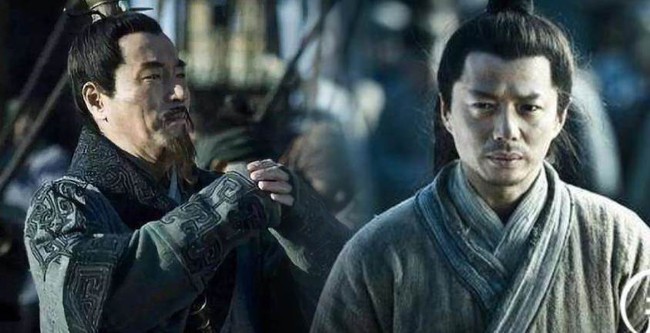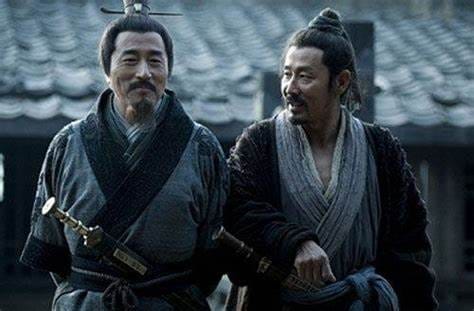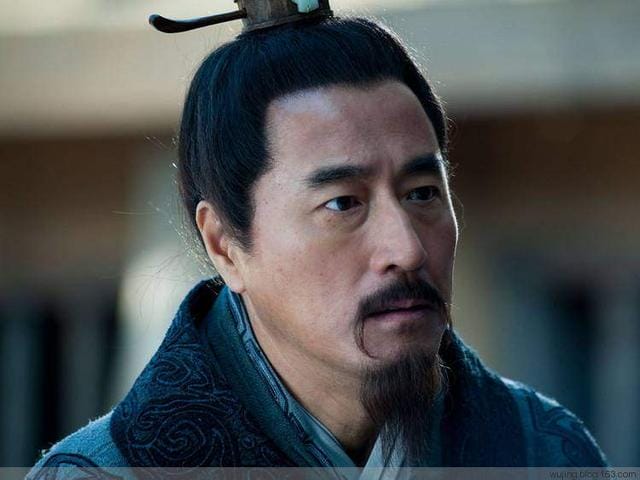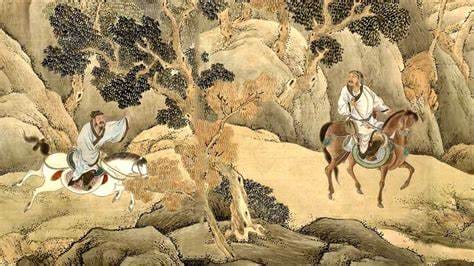Tiao Ha was a renowned chancellor of the Han Dynasty, playing a significant role in helping Liu Bang, the founding emperor, establish his reign during the tumultuous Han-Su conflict. Together with Zhang Liang and Han Xin, Tiao Ha is celebrated as one of the three great contributors to the Han Dynasty, known collectively as the “Three Heroes of Early Han.”
A famous saying from later generations, “Without the Three Heroes, there would be no Han Dynasty,” highlights the importance of this trio.

Tiao Ha and Han Xin, two founding heroes of the Han Dynasty – Photo: Internet.
Tiao Ha was instrumental in bringing Han Xin to Liu Bang’s attention, but he also bore some responsibility for Han Xin’s demise, leading to the saying, “Success comes from Tiao Ha, failure also comes from Tiao Ha.”
The Legendary Life of Tiao Ha
The life of Tiao Ha is documented in the “Records of the Grand Historian” and passed down in the “Book of Han.” In 202 BC, after defeating Xiang Yu, the world began to stabilize, and Liu Bang rewarded his loyal supporters. During this time, a debate over merit arose in the Southern Palace of Luoyang.
In the end, Tiao Ha emerged as the foremost contributor. In terms of titles and rank, he was placed above all others. Tiao Ha was not only granted the title of Marquess with a fief of 8,000 households but also received the prestigious honor of wearing a sword in the court, entering the palace with great dignity.
Though Tiao Ha came from a scholarly background without military accomplishments, Liu Bang insisted on ranking him above seasoned generals who had risked their lives on the battlefield.
A court official, Ge Jun, observed the dissatisfaction among the generals and stood up to declare that Tiao Ha’s contributions were eternal, while the generals’ were fleeting.
While this statement may have been somewhat exaggerated, it resonated with Liu Bang’s sentiments. Indeed, when it comes to the foundational achievements of the Han Dynasty, Tiao Ha’s contributions are undeniable.

Tiao Ha, a close friend of Liu Bang from their early days – Photo: Knews.
Pushing for Han Xin’s Appointment
In 206 BC, Liu Bang was appointed as the King of Han, leading tens of thousands of troops along the Ziniu route into Han Zhong. Many soldiers were from the land of Su, and a significant number deserted along the way. When the army reached Nanzheng, Tiao Ha received word that the Chief Military Officer Han Xin had also deserted. Without consulting Liu Bang, Tiao Ha hurried after him.
Han Xin was ambitious and had grand strategies that Liu Bang initially failed to recognize. This was not Liu Bang’s fault; it was akin to a sparrow judging the aspirations of a soaring eagle.
As a result, despite the initial support from Deng Gong and later from Tiao Ha, Liu Bang only appointed Han Xin as Chief Military Officer, assigning him to assist Tiao Ha with military supplies. Han Xin felt that remaining in Liu Bang’s army would stifle his potential, leading him to contemplate leaving.
Tiao Ha caught up with Han Xin and urged him to return, immediately arranging a meeting with Liu Bang. Though Liu Bang could not yet appreciate Han Xin’s immense talent, he regarded Tiao Ha as indispensable.
Responding to Tiao Ha’s suggestion, Liu Bang promptly agreed to promote Han Xin to general. Tiao Ha insisted that this title was too minor and recommended that Liu Bang appoint him as Grand General, prompting Liu Bang to comply.
Tiao Ha noted that appointing a Grand General required proper rituals and ceremonies, which Liu Bang, who usually despised such formalities, surprisingly accepted with laughter.
On the day of the appointment, Han Xin presented grand strategies to pacify the northern regions and aimed to compete for dominance in the east. Liu Bang was overjoyed and filled with regret for almost losing such a remarkable strategist.

Despite being the chancellor, Tiao Ha could not speak up for Han Xin – Photo: Kneew.
Submitting to Lady Lu’s Demands, Deceiving Han Xin into the Palace
In 196 BC, the State of Zhao’s General Chen Xi rebelled in the Dai region, prompting Liu Bang to lead a military campaign against him. One day, Lady Lu summoned Tiao Ha to the palace and informed him that Han Xin and his followers had conspired to aid Chen Xi in harming her and the Crown Prince. She then ordered Tiao Ha to trick Han Xin into the Chang’an Palace for execution.
Tiao Ha felt conflicted. He knew Han Xin to be a person of integrity, one who would repay even a simple meal with great gratitude, and who would not betray. Furthermore, Han Xin was in command of troops in Qi and held significant power. If he had intended to rebel, he could have easily done so.
However, Han Xin believed in keeping his word and dismissed the counsel of Wu Xie and Kuai Jie, choosing not to pursue power-sharing ambitions.
Why would Han Xin rebel after Liu Bang had unified the realm and established stability? Additionally, during the early Han period, Han Xin was appointed as the King of Su in his homeland, a position of great power.
If he were to rebel, why not align with the King of Huainan or the King of Liang at that time? Why wait until he was confined in Chang’an, sick and absent from court for six years, to plot a rebellion?
Moreover, the only external threat was a minor general from the distant Dai region; how could that pose a real danger? Thus, Lady Lu’s claims were illogical both emotionally and rationally.
Yet, at this moment, Tiao Ha could not defend Han Xin. He understood that Han Xin’s real peril stemmed from his exceptional achievements, raising suspicions from Liu Bang and Lady Lu.

An artistic depiction of Tiao Ha chasing after Han Xin under the moonlight – Photo: Internet.
Six years prior, Liu Bang, following a plan by Chen Bin, had contemplated killing Han Xin while visiting Yanshan but ultimately hesitated due to Han Xin’s considerable influence.
However, Lady Lu was more tyrannical and cunning than Liu Bang. Tiao Ha realized that refusing her orders could endanger his life.
Ultimately, the once-mighty Chancellor of the Han was forced to succumb to Lady Lu’s authority, gritting his teeth as he deceived Han Xin into the palace.
Tiao Ha falsely claimed that Chen Xi had been defeated and that Liu Bang had returned triumph